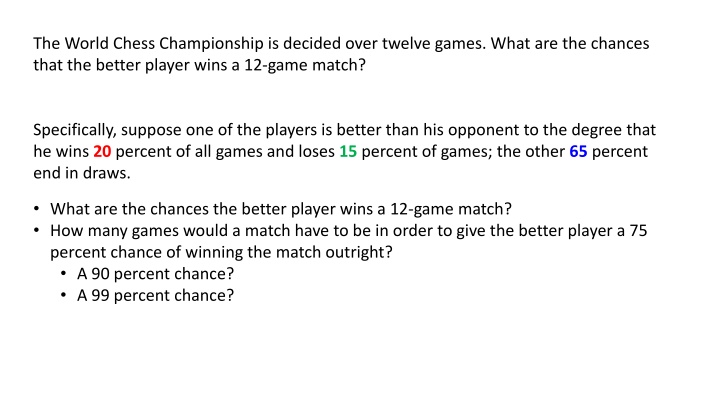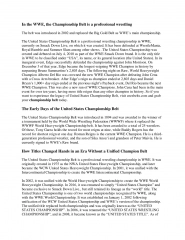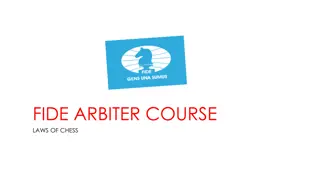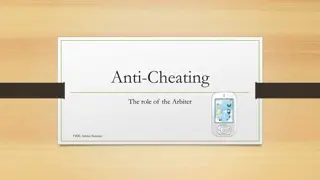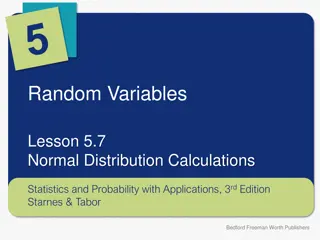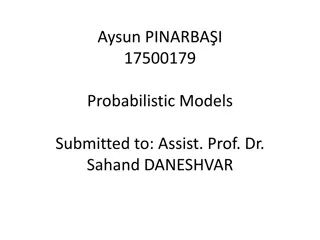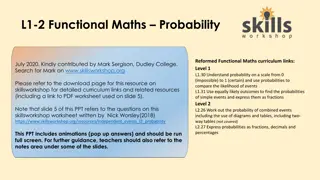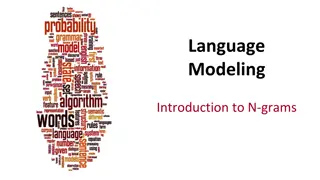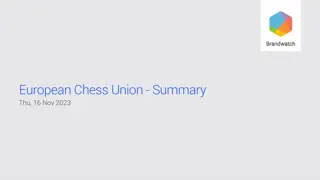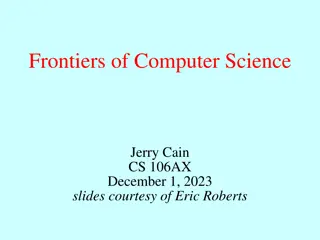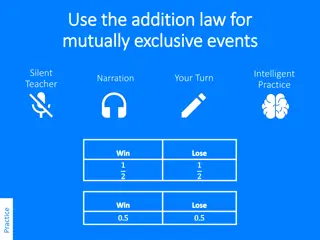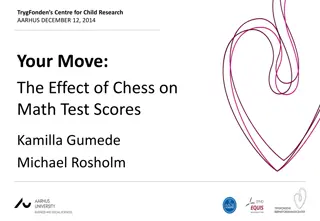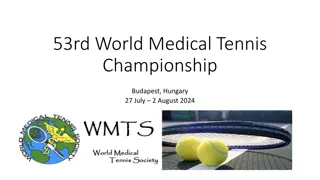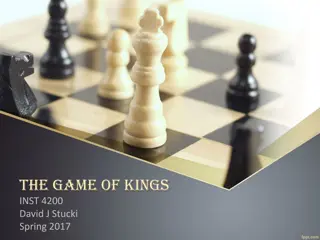Probabilities in World Chess Championship Matches
The chances of a better player winning a 12-game match in the World Chess Championship can be calculated based on the probabilities of winning, losing, and drawing individual games. By expanding the expression representing the match outcomes, we find that the better player has approximately a 52% chance of winning in a 12-game match. To achieve a 75%, 90%, and 99% chance of winning outright, the number of games needed would be 82, 248, and 773, respectively. Simulation results confirm these probabilities.
Download Presentation

Please find below an Image/Link to download the presentation.
The content on the website is provided AS IS for your information and personal use only. It may not be sold, licensed, or shared on other websites without obtaining consent from the author.If you encounter any issues during the download, it is possible that the publisher has removed the file from their server.
You are allowed to download the files provided on this website for personal or commercial use, subject to the condition that they are used lawfully. All files are the property of their respective owners.
The content on the website is provided AS IS for your information and personal use only. It may not be sold, licensed, or shared on other websites without obtaining consent from the author.
E N D
Presentation Transcript
The World Chess Championship is decided over twelve games. What are the chances that the better player wins a 12-game match? Specifically, suppose one of the players is better than his opponent to the degree that he wins 20 percent of all games and loses 15 percent of games; the other 65 percent end in draws. What are the chances the better player wins a 12-game match? How many games would a match have to be in order to give the better player a 75 percent chance of winning the match outright? A 90 percent chance? A 99 percent chance?
Specifically, suppose one of the players is better than his opponent to the degree that he wins 20 percent of all games and loses 15 percent of games; the other 65percent end in draws . Consider the following expression: (0.2x+0.65+0.15x 1)12 The coefficients 0.2, 0.65 and 0.15 are the probabilities of the three outcomes of an individual chess game, and the whole thing is raised to the 12th power because of the 12 games of the match. Expand (0.2x+0.65+0.15x 1)12 = Then, the coefficient on xr, where the exponent r is some integer, is the probability that the better player wins the match by r games. Finally, add the coefficients on all the positive powers of x, which gives the probability that the better player wins the match. The result is about 0.5198, or about 52 percent. For the second part of the problem, we can use that same approach, and just change the 12 in the exponent of the expression, and then, the same as before, expand it and sum the coefficients on the positive powers of x. The smallest exponent that gives a 75 percent chance or better is 82, the smallest that gives a 90 percent chance or better is 248, and the smallest that gives a 99 percent chance or better is 773.
function [ ] = chess() runs = 10000000; games_won =0; for g = 1 : runs points = 0; % white starts with no points for i = 1 : 12 % play 12 games dart = rand; % throw a random dart on the numberline 0 to 1 if dart < 0.2 % if dart < 0.2, white won points = points + 1; elseif dart < 0.85 % If the above is not true, and dart < 0.85, it was a draw points = points + 0.5; end end if points >= 6.5 % decide if white worn the whole tournament games_won = games_won + 1; end end games_won/runs end >> tic;, chess, toc ans = 0.519810 Elapsed time is 3.334 seconds.
1,000 runs A 90 percent chance? function [ ] = chess() runs = 100000; oddsOfWining=[]; for numberOfGames = 12 : 1000 games_won = 0; for g = 1 : runs points = 0; for i = 1 : numberOfGames dart = rand; %throw a random dart on the numberline 0 to 1 if dart < 0.2 % if dart < 0.2, white won points = points + 1; elseif dart < 0.85 % If the above is not true, points = points + 0.5; % and dart < 0.85, it was a draw end end if points >= (numberOfGames/2) + 0.5 % decide if white worn the whole tournament games_won = games_won + 1; end end oddsOfWining(numberOfGames) = games_won/runs; end plot(oddsOfWining) end 1,000,00 runs 248
Summary For some problems, it may be hard to compute an exact closed- form answer. In such cases, we may be able to compute a Monte Carlo approximation.
